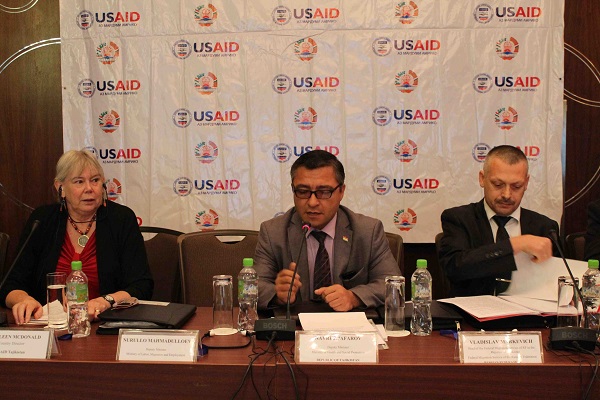
05 October 2015 - On September 29 and 30, the Tajik Ministry of Health and Social Protection convened a regional workshop on strengthening cross-border tuberculosis (TB) control, prevention and care among migrant workers from Central Asia and their families. The workshop funded by the USAID TB Control Program, gathered representatives from health and migration departments of Kazakhstan, Tajikistan, Turkmenistan, the Kyrgyz Republic and the Russian Federation to discuss improving access to TB care for migrants in the region.
The goal of this regional workshop on Cross-border TB Control, Prevention and Care Among Migrant Workers from Central Asia is to prepare recommendations for action to improve access to TB services and the health and well-being of migrant workers and their families through common coordinated actions and collaboration on a regional level.
Labor migration from and within Central Asia is a well-known phenomenon. Migrant workers provide significant contributions to socio-economic development both of the countries of origin and the countries of destination. Remittances from Russia are especially critical to the economies of Tajikistan, Uzbekistan, and Kyrgyzstan. In Tajikistan, every third household is reported to have at least one family member who works abroad, and 98% of Tajik migrants, or roughly 1.2 million people, migrate to Russia. Tajikistan is one of the most heavily-dependent countries on external labor migration in the world. In terms of TB, the countries of Central Asia have some of the highest rates of TB and multi-drug resistant TB in the World Health Organization’s European Region. Migrants pose a formidable challenge to TB control due to their transient nature across borders. They remain particularly vulnerable to the disease and difficult to treat due to frequent travel and limited access to TB testing and treatment in host countries. In Tajikistan, the percentage of migrants among new TB cases increased to almost 19% in 2014.
The USAID TB Control Program is a five-year program which aims to reduce the burden of tuberculosis in Tajikistan. It focuses on enhancing national TB policy and improving access to diagnosis and treatment. The Program supports a patient-centered approach to TB care and strengthens laboratories in Sughd, Khatlon, and the Rasht Valley.
The USAID TB Control Program is one of the many assistance projects made possible with support from the American people. Since 1992, USAID provided over $1 billion in programs and humanitarian aid that support Tajikistan’s democratic institutions, health care, education and economic growth.
Source: Stop TB Partnership